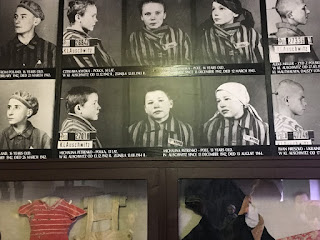One thing that has continuously shocked me throughout my time spent visiting the camps, sitting in lectures, reading various works of literature and listening to survivors has been the treatment of children throughout the Holocaust. Prior to this class, I had never given much thought to the treatment of children. In my mind, children were off limits to the cruelty of the Nazis. It was hard for me to imagine that anyone could act so inhumanely towards innocent children.
Upon entering block number
6, I was moved by many of the exhibits within. Somehow, seeing the uniforms the
prisoners wore paired with pictures of the inmates struck a chord with me. Also
in this block there were cases filled with belongings of children recovered in
the camps. Little trinkets and toys reminded me of the innocence of the poor
children. It hurt me to think how different their upbringing was from my own.
They weren’t able to live a carefree lifestyle that I think all children
deserve. Further into the exhibit, images of starving inmates and examples of
what they would eat on a daily basis. Once again, the images of the starving
children in particular deeply saddened me. The faces of the children appeared
adult like, aged by the horror they had experienced.

In Auschwitz, around 240,000 children were brought into the camp but by the time the camp was liberated, only 600 children had lived that long. An overwhelming amount of these kids who died had been brought to the gas chambers upon arrival because they were not useful to the Nazis. Being a Jewish child was an immediate death sentence. It was also very common for pregnant women to be murdered but about 680 births took place in the camp. However, of those 680 births, only 46 children lived long enough to be liberated. Often times the children were taken at birth and proceed to suffer immensely at the hands of Dr. Josef Mengele as he used them as human guinea pigs for his sick medical experiments. More often than not, the kids that were experimented on had horrible and inhumane deaths. Knowing not only that kids were subjected to the excruciating life in the camp but also suffered more so due to medical experimentation made visiting block 6 all the more difficult.
Children, specifically Jewish children, suffered even before entering the camps. In Alexander Donat’s Holocaust Kingdom, Donat recounts moments that he witnessed cruelty towards children. In one example, while loading Jews into the cattle car heading from the ghetto to the camps, incredible brutality was directed towards a child hidden in a mother's backpack. Donat, not wanting the same fate for his own son, made an incredible effort to save his son from the being sent to the camps. Miraculously he was successful in this attempt. If it were not for the help of his non-Jewish friends, it is almost certain that Donat’s son would not have survived the war.
The terrible fate of the children in the camps showed me that the
cruelty of the Nazi’s had no end. While it is still difficult for me to wrap my
head around the tragedy that occurred in Auschwitz, and other camps, it
inspired me all the more to never be a bystander and to combat any and all
injustices that occur around me. It is so easy to say that something will
“never happen” because it is just “too evil” and therefore ignore a rising
issue, but the children that suffered through the Holocaust are evident that
this isn’t true.












0 comments:
Post a Comment